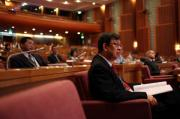
Practical information
The objective of this seminar is to try and outline the tendencies, processes or determinants that could affect climate negotiations between COP 15, in Copenhagen, and the upcoming conference in Cancún, and possibly alter its results: the increasing and increasingly visible impacts of climate change, the rise of new leaders or coalitions in the negotiations, and the development of alternative and possible competitive forums of governance. Such reflections will enable speakers and participants to give a first prospective analysis of the upcoming negotiations in Cancún.
The presentations and videos of the speeches are available below.
Other events

From Ambition to Action: Exploring Technological Partnerships with India
The 16th EU-India Summit, held on January 27th in New Delhi with European leaders António Costa, Ursula von der Leyen, and Prime Minister Narendra Modi, marks a significant milestone in deepening EU-India relations. At the same time, official bilateral visits from EU member states are on the rise, including that of the French President, who visited India in February to participate in the Artificial Intelligence Summit. As India asserts its technological ambitions and seeks to reduce its dependence on China, Europe is stepping up its efforts to diversify its strategic partnerships.

The Enlargement of the European Union: A Strategic Choice? France, the Western Balkans and the EU in an Uncertain Geopolitical Context
Russia’s war against Ukraine has brought the enlargement of the European Union back to the centre of European strategic debates. In this context, the Western Balkans have regained heightened visibility in discussions on the continent’s security, at a time when the international environment is marked by a growing number of destabilising factors.






